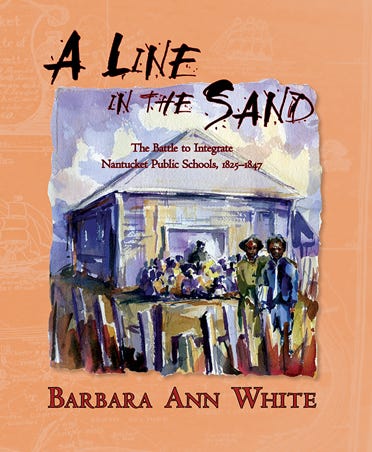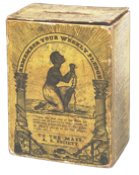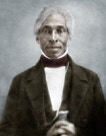Reviews & Feature Stories

$20.00
Paperback
ISBN 978-0932027-40-5
128 pages • 7.5” x 9”
60+ images
Also available as an eBook!
$9.99
A monumental struggle for equal rights took place on Nantucket in the 1840s. On one side were the island’s black community and their abolitionist allies joined by renowned anti-slavery advocates Frederick Douglass, William Lloyd Garrison, and Stephen S. Foster. On the other side were prominent town citizens who wanted no part of integration.
In 1978, a teacher from Nantucket was permitted to search the state archives for documents on the subject. In a box of uncatalogued papers, she found petitions sent in 1845 from Nantucket to the state’s General Court describing the injustices suffered by students confined to the island’s African School and pleading for legislation to make it possible for them to attend Nantucket’s other public schools. The petitions say it all, especially one signed by a young woman who at that point had been waiting years for the opportunity to enter high school.
From the petitions, town records, court records, newspapers, and letters, Barbara White has reconstructed the story of how perseverance on the part of islanders—men and women, black and white together—overcame cruel racial prejudice. Throughout our country’s history, the very same battle has been fought and won again and again. In this book, Barbara White has returned to us an inspiring account of courage in the face of adversity—for Nantucket, New England, and the nation as a whole.
Impeccably researched and beautifully told, Barbara White’s A Line in the Sand is an instant Nantucket classic. But it is also much more. As recounted by White, the integration of the Nantucket schools is the story of not only a remarkable island community in the mid-nineteenth century but of a nation struggling with many of the same issues of equality and race that concern us to this day.
—Nathaniel Philbrick, author of
In the Heart of the Sea: The Tragedy of the Whaleship Essex
Barbara White does justice to an important part of Nantucket’s most challenging and enlightening history. She goes beyond what is available in our history books about black Nantucketers to write this powerful story of the equal education movement.A Line in the Sand reveals Nantucket as a microcosm of this nation’s conflicted campaign to end slavery and provide education in schools open to all children.
— Beverly A. Morgan-Welch, Executive Director,
Museum of African American History, Boston




Barbara White holds a master’s degree from Boston University in African-American Studies, as well as a master’s degree in Educational Administration from the University of Lancaster in England.
Barbara was a teacher in the Nantucket Public Schools for 33 years until her retirement in June 2004. She taught in the high school and the middle school, where she also served as interim principal.
In 2005, Barbara received the James Bradford Ames Fellowship administered at UMass Boston. She used the grant to further her research of Nantucket abolitionist-teacher, Anna Gardner. Her research was presented at a symposium in Boston and published in 2006 by University Press of America in Nantucket’s People of Color: Essays on History, Politics, and Community, edited by Robert Johnson Jr.
Barbara’s work on African-American history on Nantucket was first funded through a Rockefeller Foundation scholarship received in 1978, and resulted in the publication of this title’s first edition, The African School and the Integration of Nantucket Public Schools 1825-1847 (Boston University Press). Her work encouraged preservation of the African Meeting House, now owned and managed by the Museum of African American History in Boston. She continues to research Nantucket’s abolitionist past.